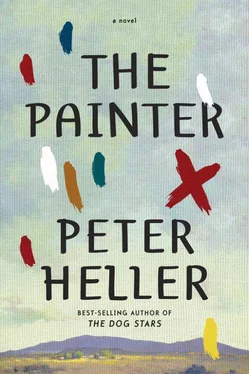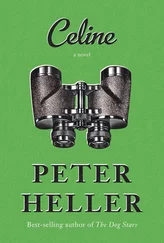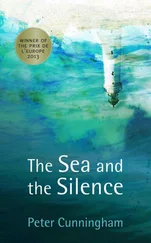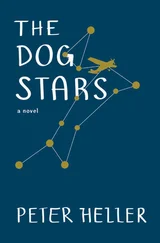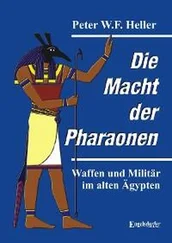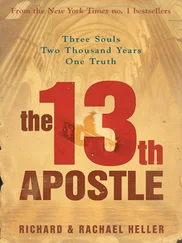Sofia was out somewhere thank God, maybe at the gallery, maybe in the plaza shopping for a necklace, I told her to get one. I left the painting on the easel, I had my coat, the keys were in the pocket, I hustled down to the lobby and fetched the truck and drove up the Paseo to the Old Santa Fe Trail and drove straight south under the long ridge and turned up it at Double Arrow, the same road to Pim’s, climbing the washboarded dirt too fast and rattling my teeth. It was a bright clear cold morning. At the gate across the road I punched in the four numbers I remembered and pulled over in a shallow pullout under some tall pines. As soon as the engine cut and I heard the wind feathering in the needles and smelled the sunwarmed bark I felt better. I crunched over fallen needles into the woods. The juniper trees were a blue-green and they riffled in the stronger currents of wind. Their dusty berries littered the ground. A squirrel squealed and chattered. Squawk of distant crows, echoing the empty spaces, ridge to ridge. I walked uphill breathing hard and came to a small clearing. The Buddha was there cross-legged on his stupa, a little bigger than a normal man. The dirt had been cleared around him and laid with polished stone flags. I had heard that Buddhists walk clockwise around the Buddha with their hands at their chests in gratitude and prayer, it was about the only thing I knew about Buddhism and right now I needed all the help I could get. I got on the flagstone path and pressed my hands in prayer and I walked. I walked around three times. I prayed.
Forgive me.
Forgive me everything.
I want to love all things. I don’t know how. I don’t know how.
Please help me.
I walked and prayed harder. I heard the wind in the trees like water, like a creek.
Please give the brothers peace. Wherever they are, some measure of peace. I wish that for them. Please please please God whoever you are. Please let Alce be joyful, let her spirit fly in joy. Please oh please God. Buddha, forgive me, grant me some peace. Please. Alce, sweet girl, forgive me. Forgive me. I wish you were here I wish I wish we could go fishing this afternoon.
Oh please. Let me live somehow in peace. In truth. Thank you for not killing me before I could ask.
It was all a jumble. Like that and repeated and jumbled. I knelt on the rock in front of the statue and lifted my eyes to his eyes. How I remembered them: the color of a calm sea, without judgment, seeing things exactly how they are, seeing me. Like Irmina but without concern or worry. Conveying a deep and cool peace.
I sat on the knoll with the pines whispering and the Buddha looking down on me. I sat all afternoon, sat as the air turned frosty in the dusk and I was shivering with cold but not shaking with fear anymore, and I got up stiffly and walked back down the hill. I drove back barely seeing the gravel ahead, but just before the stop sign at Zia Road I saw the El Camino parked against the trees. I went through the intersection digesting the image, then pulled over and began to back up fast, half turned backward in the seat, two wheels on the soft shoulder. Fuck him, haunting me like a hit man. What was he trying to do? Why didn’t he just plug me? But his headlights flared and he peeled out and turned down Zia and was lost to sight at the first curve.
CHAPTER SIX

When I got back to the hotel there was a TV camera, a news girl, and three print reporters holding out little recorders. They told me their papers as I walked by: the Albuquerque Journal , the Inrock alternative weekly, and the magazine Art in America . The news girl was wearing a red knit rolltop sweater, tight black pants and stilettos, and her lipstick matched her top. Definitely local. Her hair was sprayed into stiff curls at the edges of her cheeks. She looked Navajo and a little tense, like she was on her first big assignment. The print reporters started right in.
Mr. Stegner Mr. Stegner can you confirm that you are a suspect in two murders?
Do you have a lawyer? Who is it? Why isn’t your lawyer making any statements?
Are you working on any paintings now?
The hotel says you like to go fishing in the afternoon. Where did you go?
Well. Steve had clearly not gotten the hint. I shrank away from them. I knew that if I waved my hand and said Sorry , that would suit their purposes as well as an interview. Reclusive fisherman-artist-maybe-turned-vigilante refuses comment. We caught him returning from an afternoon fishing.
I needed a smoke. I couldn’t smoke anywhere in the hotel except the roof and I didn’t want to lead the wolf pack up there. The anger, the hatred of this spectacle boiled up. The girl had advanced uncertainly and held out her mic and said, almost pleading, Mr. Stegner, can I have a few words?
Something about her diffidence struck me, and that she hadn’t hit the right note yet with her dress and makeup. She was probably from one of the pueblos. She needed a break. I felt for her. What the hell.
I pivoted like a bullfighter. The extended digital recorders recoiled. Having a rep as a suspected violent killer has its advantages. The reporters clammed up in unison. I walked right up to the newscaster. She stiffened, blinked, realized she probably had her story and unleashed a guileless and grateful smile. Okay, I was ready. She cleared her throat, looked down at a folded page of notes in her left hand, and spoke into the mic: “Here, just getting back from the river, we think, is our famous Taos artist Jim Stegner. He is a dedicated outdoorsman and a fanatic fly fisherman and tonight he has perhaps just returned from a long afternoon on the Rio Grande. Were you fishing?”
She smelled of perfume, a little loud. I thought how hard it is to play a role, any role. Sometimes it took half our lives to get it half right. I looked at her, I looked at the camera and stretched a grim smile. Probably looked like a hyena. How I felt.
I dug in my coat and took out the foil pack, a lighter, and lit a cheroot. I offered her one. Wave of hand. I smoked. Whoa that felt good. I scratched my chin under my beard. The print reporters gathered tightly around just off screen, held up their little recorders.
“Yes,” I said. She nodded. She hesitated. She smiled. It was not a fake smile, it was real, a little too vulnerable, and I thought, Get out of this business .
“My father used to take me fishing on the Animas when I was little. We used worms.” She wrinkled up her nose.
I stared at her through the smoke. Suddenly I could see it, her and her father—who was heavy but agile and wore an oversize t-shirt that didn’t hide the tribal ink running down his arms—I could see them stepping down the bank with a bucket, throwing out bobbers. The image paralyzed me.
“You look shocked,” she said. “Are you okay?”
I shook myself. How long had I been staring at her with maybe my mouth hanging open? I took a long draw and let out a cloud of smoke to cover for a sec while I got my wits back. I had seen a stark image of this woman as a girl stepping into the water, the covered stones, holding her rod high, following her father. Stark because there was nothing else in the world but the swift dark current and the two of them.
“I—I—”
I was speaking, but no words came. She glanced down at the folded paper. She looked a little bewildered. She said quickly, “You have been through a rough time these last few weeks, these last few years. I know what an escape fishing can be. Painting must be that way, too. Has it been extra stressful?”
I didn’t answer. The camera was on me and she was reading straight off the paper.
Читать дальше
